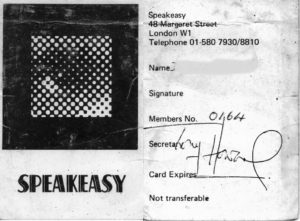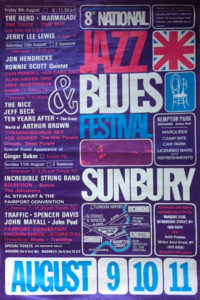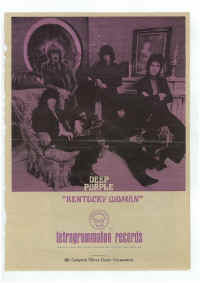The news that we had entered the US charts gave us a tremendous lift. Obviously, Bill Cosby and Tetragrammaton knew exactly how to market a good record as opposed to EMI who had done absolutely zero! The Americans wanted to know more about us and so we all went to the Feldman office in Soho, where we were each interviewed in turn, with Jon playing the role of interviewer. I cannot recall who interviewed Jon. We began to socialise together at London clubs, particularly the Cromwellian Club which was run by affable ex-wrestler Paul Lincoln, who of course was responsible for the early success of the 2-I’s coffee bar where so many future stars were discovered. Paul had also invented the masked wrestling persona of the famous Doctor Death, who apparently had his name franchised out to other wrestlers, a situation made possible by the fact that Doctor Death never lost a contest, and therefore never had to be unmasked!

As we became a little more recognised, the resident DJ always played ‘Hush’ when he saw us enter the club. The Speakeasy in Margaret Street was another favourite watering hole for the music business. Usually, on a Tuesday night I would meet my old pal Rod Freeman at the “Speak”. he was naturally proud that his arrangement of Hush was doing well. Often, we were joined by another of the ”Marshall Gang”, bassist John Entwistle of the Who, a band that were also starting to crack America. Rod was still performing at the Top Rank ballroom in Reading with a great band including vocalist Ashley Holt and the great Ken Rankine on bass. Rod was always ambitious and one day I called by his flat to find him composing a tune with the young keyboard player from the band, who introduced himself as Richie Wakeman. As our single continued to rise in the US charts enough interest was generated to land us a spot on the biggest up-and-coming TV show at the time – the David Frost show.
This show was also the beginning for the Two Ronnies, Barker and Corbett, who provided brilliant satire and humorous sketches. During rehearsals we wandered into the TV Centre canteen for lunch, to be faced with so many famous faces that we found ourselves saying hello to people that we felt were almost old friends. Collecting my tea and beans on toast, I found that there was only one vacant chair and so I found myself sitting next to Kenneth Williams of the “Carry On” movies. Turning to his companion, another of my boyhood heroes, comedian Ted Ray, he boomed out in that famously hilarious voice, “Ooh look Ted, it’s one of those pop stars!!”. When the time came to perform, following David Frost’s interview with Kenneth and Ted, all the adrenaline kicked in, knowing that we were playing live on television for the first time in front of the whole country!
One of our team had come up with the idea of giving each member of the audience a purple carnation to pin to their lapels, helping to cement our name in their memories. Introduced by the host, David Frost, we received polite applause before launching into ‘Hush’, as loudly as the studio engineers allowed. Sadly this show came before the advent of video recorders, so no footage of our TV debut exists, but according to friends and family watching at home we performed ok. Live television was always a bit nerve-wracking, as our co-performer Engelbert Humperdinck discovered, stumbling over the lyrics halfway through his latest hit!
Shortly after our first TV show we played a gig at London’s Roundhouse with several other big-name outfits. Early in the evening I was summoned to the door where a couple of pals were trying to gain entry, just in time to hear one of them arguing with the doorman, shouting that he’d only come to see the “Purple”! That was the first time I had us called that, and felt rather proud. We all felt after the show that our performance was pretty good, but back in the dressing room John Coletta looked rather downcast. I asked what was wrong and he explained that Mick Jagger had been in the audience and didn’t like us. Richie and I looked at one another and said, almost in unison, “the time to worry is when he does like us!”.
One exciting gig was a last-minute addition to a show in Berne, Switzerland, featuring top acts the Small Faces and Dave Dee, Dozy, Beaky, Mick and Tich, both at the peak of their careers in 1968. The Small Faces were rather aloof backstage, but by contrast Dave Dee and co. were extremely friendly and a joy to hang out with. We were pleasantly surprised on arriving at the venue to find a top 10 chart pinned to the door, showing that Hush was riding high in the Swiss charts. This fact naturally boosted our standing on the bill, so when we went on stage after several other bands our reception was quite amazing. The audience loved our show so much that a riot ensued when we finished, with police called to calm them down. I saw an opportunity here and suggested that Coletta made sure that our new PR guy got the story to the music press. However the next copy of the Melody Maker carried the large headline “Dave Dee and Company cause riot in Switzerland”!
A happy event took place in on July 20th when my great friend Carlo Little married Iris. Carlo was still drumming with the Flowerpot Men, who all attended along with many other musicians, family and friends. But panic ensued shortly before the wedding day when the church organ broke down, but help was at hand and Jon Lord’s Hammond was delivered to the church in time for the ceremony! Apart from Deep Purple, other musicians in attendance included Billy Day, Matthew Fisher, Noel Redding plus all the Flowerpot Men.

We discovered on a visit to the famous Marquee club that one of its directors, Jack Barrie, was quite a fan of ours. He suggested that an appearance on the forthcoming Sunbury Blues Festival would be great promotion for us and so he pulled the necessary strings to secure us the opening spot on the big stage where the name bands performed. On arrival we felt a bit of a hostile atmosphere, with few people bothering to speak to us. Richie at this time was going through a rather angry phrase towards the business in general with its lack of interest in us, and the promotion of musicians that he considered unworthy. Seeing a small crowd watching Alvin Lee (no slouch himself) going through a sound check, Richie couldn’t stop himself walking out and plugging into an adjacent amplifier. Standing next to Alvin, Richie proceeded to deliver about ninety seconds of the fastest, most blistering example of high-powered rock guitar that the watchers had ever witnessed. As their mouths fell open in disbelief Ritchie than walked off, muttering” Take That!” under his breath. I thought that his attitude would bode well because we knew that we could deliver, even in a hostile atmosphere. Sadly the show was a shambles due to a malfunctioning sound system. As we launched into Hush the bass amp packed up for good and we were left floundering, much to the delight of the watching press! Luckily no other act had to endure similar problems. Were we sabotaged? Without a doubt! To add insult to injury, the leading press hack reported that Joe Cocker opened the show. We needn’t have bothered!
During the same month we began work on our next album, to be called The Book of Taliesyn. Naturally we wanted to work with the same team as before, and as Barry Ainsworth and Martin Birch were now working at De Lane Lea studios in London Kingsway that’s where we elected to work. Although Hush and the Shades LP had not yet peaked in the U.S., Tetragrammaton were already pressurising us for new material so the heat was on us, not quite as desperately as before, but still too much pressure to allow us to be as creative as we could have been. One big bonus so was that shortly after starting to record, the studio took delivery of the latest innovation – the eight-track machine! The possibilities of what could be achieved with four extra tracks was a huge boost to the group.
It was during this period that we began to hire a rehearsal room at the Red Lion pub in Acton High Street. We usually met for lunch at the local Chinese restaurant which was only yards from the pub. During our first rehearsal I began to experiment by playing through Richie’s fuzz box, a bespoke model which was put together by a local electrical genius. I began to run through a series of my favourite warm-up riffs when Richie suddenly yelled, “What was that? Play it again!”. “That” was a bass line that I had found on Ricky Nelson’s version of Summertime, and it excited Richie tremendously. “We can use that”, he explained. “Not really”, I said, ”It’s not original”. Ritchie, however, thought differently and filed it away for future use. Unwittingly I had supplied the handful of notes that would, in the future, morph into Black Night, rescuing the fortunes of the Mark II line-up and possibly saving their careers! (you can thank me later fellas!).
During the Red Lion rehearsals we began to routine an extended version of Ike and Tina Turner’s hit, River Deep, Mountain High for our stage show. By now it had become normal for us to play at enormous volume, making us probably one of the loudest outfits ever. Unfortunately the Red Lion was next door to Acton Police Station, and the police could not hear their own messages! After several requests, then commands, to turn down, we knew that the Red Lion days were numbered. I knew of a rehearsal place that had proved useful in the past, and so I introduced the band to Hanwell Community Centre, a large gothic looking complex that had once been a Victorian children’s home for the poor and destitute. Famous for once having the young Charlie Chaplin as a resident it was reputed to be haunted and had many spooky tales attached to it. Most of the Taliesyn album was rehearsed here following our departure from the Red Lion.
Seeking inspiration for the album proved quite difficult as we had still not been together long enough to have forged a direction. The type of material which suited us best was still in its infancy, with only Graham Bond and Vanilla Fudge playing really hard rock. In fact I think that it’s fair to say that these two acts practically invented the genre which in years to come would be termed “heavy metal”. At that time the music scene was as diverse as ever, with different acts in the charts such as Mary Hopkin, Esther and Abi Ofarim, jockeying with Tommy James, Cliff Richard, even Louis Armstrong. One act that impressed was The Crazy World of Arthur Brown who made everyone sit up!
As life continued at 2nd Avenue, we all rubbed along pretty well. Richie and I would regularly go running at night in an effort to keep fit, something which never appealed to the others although Ian joined us once, with once being enough! The only concern was that some of the band considered that roadie Dave Jacobs was showing a rather cavalier attitude to some aspects of the running of our household, which lead to a decision to fire him. No one wanted to do it however and, in the end, I was elected. This was the start of a trend whereby I was always asked, if anything unpleasant had to be said, leading in future to our management being very wary of me! With Dave gone we needed a replacement who soon appeared in the form of Mick Angus, who just happened to be the very first person to audition as our vocalist. By August 24th of that year Hush reached number 33 on the US chart, just three weeks later it hit number 4, so this was a great period for us. HEC Enterprises could not believe their luck at such quick success, and Ron Hire celebrated by putting a deposit down on a larger house. John Coletta also surprised me with a real treat, handing me the keys to the new band car, a pristine almost new Jaguar 420G, at the time the biggest saloon car available, absolutely huge and amazingly comfortable.

The recording proceeded with the team of Derek, Barry and Martin once again working well together. I felt that most of the material was well played, particularly The Shield and Wring That Neck. Until I came up with that title, we had always referred to it as the “Hard Road” number, being a shuffle beat, and it caused a little confusion which led to it being called Hard Road on some recordings. Pushing for a new single, Jon suggested Neil Diamond’s Kentucky Woman. Richie and I both had reservations as it was a bit folky, until I suggested giving it the Mitch Ryder treatment. I had purchased several records by Mitch Ryder and the Detroit Wheels and was impressed with the aggressive drive and sheer excitement. As I outlined my idea as to how a folk song could be made to rock, the others soon latched on and soon we had cut our next single, complete with Ron Hire and his young daughter helping out with hand claps. I was not too keen on We Can Work It Out, not being much of a Beatles fan, and I thought that we could be creative by putting our heads together, but time was of the essence and I was overruled. Our extended version of River Deep, Mountain High proved popular at gigs and was also needed for the album. Ian provided timpani drums played in the depths of the basement car park to great effect, whilst Jon borrowed some music from the movie 2001, also to great effect. Jon’s agenda was becoming more obvious by now and we had allowed him to indulge himself with Anthem and Exposition, although Richie and myself would have preferred harder material. To be fair, however, they were both quite clever and well performed, so no one complained.
At last, with the month of October approaching our first US tour had been finalised. With both our first single and album still riding high in the charts we packed our cases and prepared to depart for America, not quite able to believe our colossal achievement in less than eight short months. In those days very few people visited America and so we were about to enter unknown territory! We excitedly discussed the situation on the night before departure, with some concerns being voiced about the length of the flight, some thirteen hours in those days. How, how we asked, can a plane stay airborne for that long?
Early the next morning a limousine arrived to ferry us to Heathrow Airport. During the journey John Coletta gave me some welcome news. He knew of my ambition to own Deeves Hall and apparently a 99-year lease was for sale at a very reasonable price. After confirming that I would like to buy it, John promised to telephone the agent from the airport. Sadly however, someone had beaten me to it and Deeves Hall was sold! Although extremely disappointed, nothing could dampen my excitement for long and by the time we boarded the Pan Am Boeing 707 it was already forgotten. Deep Purple were on their way!
| Chapter 21 ← | → Chapter 23 |
